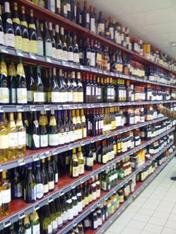 A bill is about to hit the floors of both the New York State Assembly and Senate that would permit supermarkets to start selling wine statewide. If the bill happens to pass, it would close out a thirty year argument in New York, one that has been neatly opposed by the state’s local independent wine shop lobby. Their claim? Unfair competition for small stores from big stores. And because states can still do just about whatever they want regarding alcohol regulation, the special interests of wholesale/retail beer and liquor lobbies combine with legislators’ self preservation instincts all too often, choking evenhanded supply chains and healthy competition….just because they can.
A bill is about to hit the floors of both the New York State Assembly and Senate that would permit supermarkets to start selling wine statewide. If the bill happens to pass, it would close out a thirty year argument in New York, one that has been neatly opposed by the state’s local independent wine shop lobby. Their claim? Unfair competition for small stores from big stores. And because states can still do just about whatever they want regarding alcohol regulation, the special interests of wholesale/retail beer and liquor lobbies combine with legislators’ self preservation instincts all too often, choking evenhanded supply chains and healthy competition….just because they can.
Last year, the Wall Street Journal reported on the failure to pass legislation despite Governor Paterson and Albany’s need for cash. Making shelf space for wine in New York grocery stores is estimated to generate more than $150M in new state tax revenue. Passing the bill would also create more than 6,000 new jobs in the first year at retail and with New York State winegrowers, who would benefit immensely from the expanded in-state distribution. Locally made wines sell well in their own backyards. If Michigan or Minnesota winegrowers’ positive impact on their own states’ economies are fair examples,  then why has Albany stalled so far? In a major way, it’s the work of folks like Michael McKeon of the liquor store owner lobbying coalition Last Store on Main Street, fervently working to uphold long time state sanctioned restrictive trade practice. Worse yet, substantiated reports say this lobby masquerades as a mom and pop “knight in shining armor” but is nothing more than a frontline large wholesaler trojan horse strategy funded by their own “big booze” money.
then why has Albany stalled so far? In a major way, it’s the work of folks like Michael McKeon of the liquor store owner lobbying coalition Last Store on Main Street, fervently working to uphold long time state sanctioned restrictive trade practice. Worse yet, substantiated reports say this lobby masquerades as a mom and pop “knight in shining armor” but is nothing more than a frontline large wholesaler trojan horse strategy funded by their own “big booze” money.
Good Grape blogger Jeff Lefevre has produced a two-part series at Forbes.com about the dynamic forces affecting today’s wine consumer. Jeff shares highlights from both Impact Databank and Nielsen research:
American wine-consumption recorded its 17th consecutive annual increase and domestic consumers spent more than $40 billion on wine last year, another all-time high.
In addition, Nielsen research presented in April 2011 indicates that wine was the number one product in unit growth at mass market outlets for the 52 weeks ending January 22, 2011.
The wine market is expanding and the number of outlets selling wine in New York has been shrinking. There is absolutely room for more distribution points. The New Yorkers for Growth and Open Markets organization provides a great checklist of the positive impact the legislation offers, with a piece of compelling research that shows 70% of current wine consumers would continue to buy wine at liquor stores and incremental sales from grocery store distribution would  primarily expand the market resulting in very minor liquor store sales erosion. This time around, the Associated Press reports the bill has some decent bi-partisan support. We’ll see. Maybe the state could share some of their new revenue with the 2800 local liquor stores they have continued to unfairly protect?
primarily expand the market resulting in very minor liquor store sales erosion. This time around, the Associated Press reports the bill has some decent bi-partisan support. We’ll see. Maybe the state could share some of their new revenue with the 2800 local liquor stores they have continued to unfairly protect?
I don’t have a horse in this race beyond promoting wine as a lifestyle and lubricant for human connection. Personally, I moved out of New York State a while ago after thirty three years of residency to escape more fundamental problems of inhospitable big city living. This whole sordid affair in New York reminded me of a favorite famous quote uttered by the 19th century Scottish scholar, John Stuart Blackie:
Wine is the drink of the gods, milk the drink of babies, tea the drink of women, and water the drink of beasts.
If the current bill fails to pass then maybe it’s time to ink a revamped bill banning water from supermarket shelves, accommodating lost revenue with the right to sell wine? Can you think of a more nonsensical path to doing the right thing?